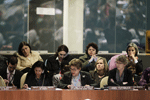Bulgaria: Government does not regulate nor monitor women’s rights
Published on Tue, 2012-07-24 09:12
Bulgarian government lacks of bodies in charge of regulating and monitoring gender equality, warned this month the civil society delegation to the 52nd Session of the Committee on Elimination of Discrimination against Women. The NGOs were represented by the Bulgarian Gender Research Foundation (focal point of Social Watch) and the Gender Alternatives Foundation, with the support of the Alliance for Protection against Domestic Violence. The approval of laws to create strong national institutions on gender equality has been identified by NGOs in international forums as a need since 1998. It has been reiterated through all these years by NGOs, and reminded to the government in the course of the UN universal periodic review in 2010, and again by the Human Rights Commission in 2011. The Bulgarian NGO delegation drew the attention of the Committee to the main issues related to the national machinery on gender equality that remain unresolved in Bulgaria, despite relentless efforts by the women’s right movement. The State answers to the Committee form a systemic issue of non compliance with the CEDAW. In the absence of strong, well equipped and resourced national institutions, it is impossible to design, adopt and monitor the much needed special measures, as the government admitted in its report to the Committee, according to the civil society. That circumstance prevents the authorities to get a proper understanding of the gender inequities and of the required policies, and defuses all other laws, policies, programs, plans and strategies on the subject to turn them incoherent, fragmented and ineffective. The general Anti-Discrimination Act does not contain explicit definition of sex discrimination. Since its inception in 2005, the Commission for Protection against Discrimination created no substantial legal practice on gender discrimination and it is not applied in cases of gender-based violence. There is no specific legislation and policy on gender-based violence and the Law on Protection against Domestic Violence do not recognize its gender implications. According to the Bulgarian Alliance against Domestic Violence, one out of four women is a victim of those crimes. In 1998, one of the dominant concerns of the CEDAW Committee was the problem of violence against women, both in the public and private spheres. The Committee recommended to strengthen the legislation. Howver, the government adopted a special law against domestic violence in March 2005. Its essence is the issuance of orders for protection containing restraining measures for the perpetrators and protective measures for the victims. The practice so far, however, reveals that besides the positive effects, there are a number of problems arising in the process of its implementation: 1. Lack of clarity in the law as to which of the parties wears theburdenofproof. 2. The provision stipulating for a one-month time limit for applying for court protection places undue administrative and legal burden on the victims. 3. The Police can neither issue emergency protection orders nor initiate proceedings under the law. 4. Specialized services such as counseling centres are not legally recognized as social services, hence not financially supported by the State. 5. There is insufficient number of crisis centers in the country. 6. No mandatory training is provided for judges, lawyers and law enforcement personnel. The Law’s amendments from 2009 were approved thanks to the efforts of women’s NGOs. One of the most important was the provision for ensuring financial support for those NGOs. However, no money was provided in 2010. The amount of BGN 500,000 (more than 300,000 US dollars) was provided in 2011. No financial support is ensured for 2012 yet. Part of the above mentioned shortcomings were already recognized by the CEDAW Committee in 2008. In that regard, it should be stated that: no mechanism for implementation of the Committee’s recommendations exists in the State; the Views of the Committee are not translated into Bulgarian; none of the Individual and General recommendations is implemented. In April 2009, under the pressure of NGOs, the violation of a protection order was criminalized and was made punishable by imprisonment or a fine. However, there are only few cases initiated by the Prosecutor’s office in that regard. Further, under the Penal Code, domestic violence is still not recognized as a separate crime or as an aggravating circumstance of a crime. Furthermore, light and medium bodily injuries are prosecuted in a private complaint procedure. The alternative report numbers several social and economic consequences of divorce for mothers. As regards the child support: ■ There are no clear contemporary criteria to define the basic needs of the child; ■ No easy or automatic mechanism to update the amount of the child support; ■ There is no full but only limited compensation by the State when the fathers can not pay the child support and the procedure is lengthy and complicated; ■ There is no remedy for mothers, who do not receive the awarded child support, to later receive adequate compensation from the fathers; ■ As a result many women do not initiate the court proceedings for child support and ■ The average amount of the child support from the father is often symbolic, many times less than what is needed for the child's maintenance. The report also summarizes inequalities in custody rights, obligations and responsibilities: ■ In the case-law non-payment of the child support is not considered as negligence of the child and no one is deprived or restricted of custody or parental rights on this ground; ■ The child visitation and contacts are regulated as a right of the father, not of the child, and as an obligation for the mother; ■ The mothers are always obliged to ensure these contacts, while fathers are never responsible if they do not appear for them. More information Source
|
SUSCRIBE TO OUR NEWSLETTER



